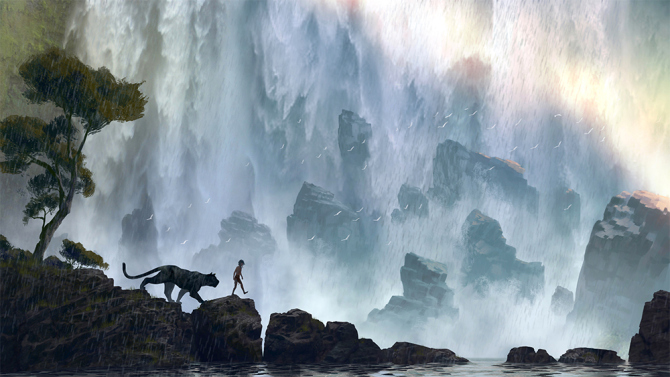After weeks overseas, you almost forget the degradation of American popular culture. Trading of insults passes for political discourse. Urban violence, drugs and prurience dominate the media. All signs of a society entering the omega phase and in dire need of rebirth.
 But there are some signs of hope. One is the unexpected popularity of a movie which advocates both books and wilderness. Jungle Book has been the most popular film in America for three weeks and sees no signs of slowing down. A movie which reveres wilderness is always welcome. A movie which reveres wilderness and still values the knowledge represented by books is rare.
But there are some signs of hope. One is the unexpected popularity of a movie which advocates both books and wilderness. Jungle Book has been the most popular film in America for three weeks and sees no signs of slowing down. A movie which reveres wilderness is always welcome. A movie which reveres wilderness and still values the knowledge represented by books is rare.
American culture has a tendency to go to extremes. Lately we’ve had Republicans advocate for lower and lower taxes and regulation while Democrats increasingly embrace onerous regulation and government intervention. Both sides are more than willing to beat each other up on the streets.
Those who recognize the value of natural ecological systems also go to extremes. Some advocate banning man from ecosystems to preserve and protect them. Many disparage any technological intervention to mitigate or remediate environmental problems. Some just want to abandon formal knowledge and go off and live in the woods.
Resilient systems never get too extreme. They are composed of multiple competing and cooperating systems which always temper each other. The wolves never get so powerful they kill off all the caribou. The wolves keep the caribou from overgrazing.
Resilient systems are always innovating. Plants are always evolving new resistance to diseases. But the innovation is always conservative. It conserves what has worked in the past. And it always provokes the response of more innovation. The disease organisms find new ways to attack plants.
Human societies have often taken innovation to an extreme where conservation is forgotten. Men get so entranced with their innovative ideas that they forget they are part of ecological cycles which must be respected and conserved. City after city has rotted, decayed and been buried in the sands of time because they used and exploited ecological systems to support innovations which returned nothing useful to the ecosystem.
The movie Jungle Book celebrates the book as a source of knowledge, but the knowledge is of how species work together and how man’s innovation can benefit ecosystems.
Jungle Book was the first hardback book I ever owned. My grandparents got it for me when they were Peace Corps workers in India. I wish every young boy had a copy.
Not everyone agrees. It’s author, Rudyard Kipling, coined the term “white man’s burden” and wrote many tracts deemed racist and imperialist defenses of colonialism. Yet his books are adored and studied in India and Pakistan, the colonies he defended.
His books are adored because his stories read like timeless fables. They tap into the deep knowledge of ecology and natural systems that we all have. We are all a part and a product of our ecosystem. The past resilience of our system, evidenced by our existence, is written in our genes and our bodies.
Kipling tapped into the truths which shaped our species over the eons. Since we are a result of those truths, we often recognize them when we see them. Sometimes we don’t. All of us, no matter how enlightened, can be swayed and deluded by the assumptions and beliefs that hold sway in the times in which we live. Kipling was taken in by colonialist, racist and imperialist trends which were rarely questioned in his day. Likewise, all too many today succumb to an anti-colonialist, anti-racist and anti-imperialist reaction which is equally unthinking.
It’s through understanding the unity beneath dualities that we come to understand resilience. Diversity, but complementary diversity; innovation, but conservative innovation; connectivity but with independence; building up infrastructure and resources but using them up to transform into a new system; valuing both books and wilderness.
So it’s great that a popular movie celebrate the knowledge of a book while extolling the value of wilderness and natural ecological systems.
Let’s hope we are witnessing a trend and not just a fad. Can’t wait for the sequels, mimics and emulations.